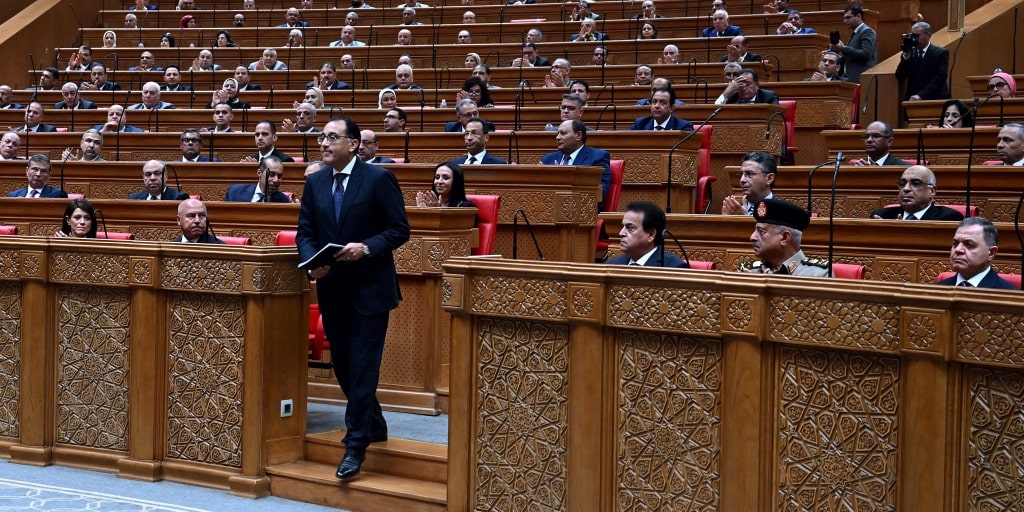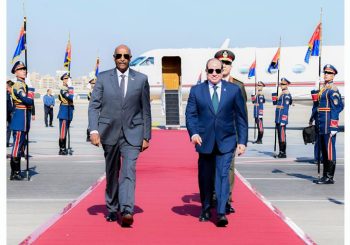Egypt’s Prime Minister Mostafa Madbouly met with the country’s parliament on 8 July to introduce the Cabinet’s new three-year policy program, aimed at addressing ongoing challenges, a Cabinet Facebook statement explains.
“The Egyptian government’s program for the next three years is based on continued construction and development to ensure a better present and a sustainable future for the next generations,” the Prime Minister said.
So, what does that entail for Egypt moving forward? What is the government tackling exactly?
Madbouly began by outlining the key axes of the new plan and future policies. These axes are national security, societal well-being, economy and attracting investments, and political stability. He goes on to highlight the key points of strategy for each axis.
NATIONAL SECURITY
National security has been a priority since President Abdel Fattah Al-Sisi took office in 2014. It was a critical point during the first years of his presidency due to a terrorist insurgency destabilizing the country, leading to several counterterrorism operations in Sinai.
The military has since resolved the issue but national security remains a significant pillar in maintaining the country’s stability. Today, geopolitics plays a critical role in Egypt’s national security, with several neighbouring countries suffering from conflicts and instability.
The axis includes essential policy points, such as maintaining border security around areas like Sinai and the Red Sea, enhancing military capabilities, and combatting terrorism.
The axis also aims to develop the country’s foreign policy, bolstering its regional role across Arab, African, and international regions.
Water and energy security were also mentioned in the list. Water security, particularly through its share of the Nile River, has been a point of concern for the government as Ethiopia continues to fill the Grand Ethiopian Renaissance Dam. With power cuts becoming a source of frustration for citizens, Egypt also plans to expand and diversify energy plants to secure more power for citizens.
Food security was another point, particularly after the country struggled to import essential crops due to trade disruptions caused by the Russia-Ukraine war.
Cybersecurity legislation and regulatory frameworks are to be reassessed and amended, in addition to increasing international cooperation in the field.
SOCIETAL WELL-BEING
The government’s attentiveness to the society’s well-being and development comes during a difficult period of economic instability and market concerns.
The axis includes points such as providing social protection, improving the standard of living, protecting irregular workers, and increasing job opportunities — all of which have been previously addressed by the government in initiatives like Haya Karima ( A Decent Life) and opening job centers.
Health and education, the main angles of the axis, are set to be bolstered by several policies.
The government looks to work on setting and achieving strategic objectives of the health sector. Most recently, they have passed a law that allows investors to privatize and improve public medical facilities for a temporary period.
The government will also work to expand accessibility to its universal health insurance system — a nationwide initiative that aims to provide all Egyptians with insured medical care. The system, currently being trialled in Port Said, Luxor, Ismailia, South Sinai, Suez, and Aswan, will soon enter its second phase and include six more governorates.
An overall improvement in the quality of education is a key goal in the axis, as the government outlines plans to train teachers and build more schools and universities.
Educational institution expansion plans include establishing 62 technical and technological schools through private investments and 100 Japanese-style public schools.
Both densely populated and remote areas of the country are being prioritized as locations for new schools and universities, as the country looks to provide access to quality education nationwide.
The final point in the axis expanding “sustainable and fourth-generation cities” — a group of newly established cities intended to modernize several governorates.
ECONOMY AND INVESTMENTS
Having experienced three currency devaluations in two years, the last being a free float, and requiring several loans and financial packages to secure its foreign reserves, Egypt’s government now looks forward to growing its economy and increasing private investment.
The axis aims to achieve a growth rate of 4.2 percent, with growth rates exceeding 5 percent on average during the three-year program period. This will be supported by enhancing the presence of the private sector to generate more job opportunities and maintaining the economic reform process set out by the government and multilateral lenders like the International Monetary Fund.
To ensure fiscal discipline and enhance financial sustainability, the government plans to increase public revenues by about 16 percent on average annually until 2026/2027. Additionally, efforts will be made to rationalize public spending, reduce total public debt, and improve financial transparency.
One key objective is to double the contribution of green economy investments to about 55 percent of total public investments by 2026. This point comes in light of the government’s aims to become a global hub for green hydrogen production by 2030.
Another point is increasing private investments to 60-65 percent of the country’s total investment, as per the State Ownership Policy, and raising the annual growth rate of foreign direct investments to about 14 percent by 2030.
Tax incentives and exemptions for domestic and foreign direct investment, already implemented by the former government, will continue under the new program — focusing on targeted industries, mainly heavy-duty industries, and certain business activities.
The axis also identified 152 specific investment opportunities to localize industry and plans to launch a comprehensive investment map displaying all investment opportunities in viable projects.
Efforts will be made to increase exports by more than 15 percent annually by stimulating merchandise and petroleum exports and enhancing service exports.
Tourism, one of the country’s main sources of direct foreign investment, is another key point in the axis. The government plans to attract 30 million tourists by 2028.
To transform Egypt into a global centre for logistics and trade, several steps will be taken through the axis. These include establishing integrated international logistics centres next to seaports.
The country will also develop seven integrated international logistics corridors to connect production areas (industrial, agricultural, mining, services) with seaports through dry ports and integrated logistics areas.
New berths will be constructed along seaports, bringing the total length of berths to 100 kilometers, and the Egyptian naval fleet will be developed to transport 20 million tons of goods annually.
POLITICAL STABILITY
Politics was at the forefront last year due to Egypt’s presidential elections, resulting in President Al-Sisi securing a third presidential term by an 89.6 percent majority vote. The same year, Egypt’s National Dialogue was launched, inviting thousands of industry experts from diverse fields to participate in governance and policymaking.
To enhance participation and governance further, the axis plans to support decentralization and empower local communities.
Mechanisms will be established to involve citizens in planning and managing projects and facilities through participatory planning committees.
Political communication with all components of Egyptian society will be strengthened, and effective channels of dialogue will be opened to ensure broad participation in the decision-making process.
Coordination with the Board of Trustees of the National Dialogue, representatives of civil society, unions, political parties, youth, women, and marginalized groups will continue to be prioritized.
Additionally, the promotion of human rights will be emphasized, with particular attention given to the groups most deserving of care, especially the elderly. Human rights conditions previously affected the country’s standing diplomatically with Western governments. In 2022, the United States deducted EGP 2.5 billion (USD 130 million) from Egypt’s EGP 5.7 billion (USD 300 million) annual foreign military aid due to the Biden administration’s concerns over Egypt’s human rights conditions.
NEW CABINET, NEW COMMITMENTS
The government’s ambitious program comes just one week after the country removed and re-elected cabinet members on 3 July. The move, mandated by President Al-Sisi in June, was intended to introduce fresh faces and new strategies.
Madbouly, reappointed as Prime Minister, now steers a new Cabinet featuring both old and new faces — all of whom are key figures in achieving the new government program.
Subscribe to the Egyptian Streets’ weekly newsletter! Catch up on the latest news, arts & culture headlines, exclusive features and more stories that matter, delivered straight to your inbox by clicking here.







Comments (0)